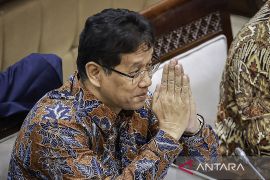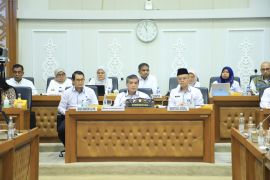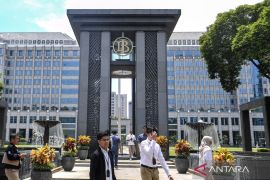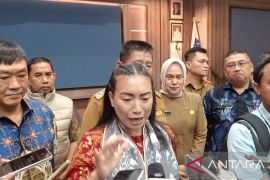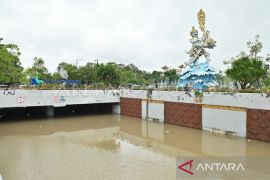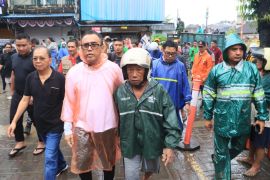WASHINGTON, Aug. 21, 2015 (Antara/PRNewswire) -- 60 Degrees Pharmaceuticals, (60P), a company focused on development of therapeutics for tropical diseases,
and Singapore General Hospital (SGH) announced today that the Hospital
has received a grant from Singapore's National Medical Research Council
to support a Phase II clinical trial among dengue fever patients.
Dengue fever, a painful, debilitating and potentially deadly mosquito-borne viral disease, infects an estimated 400 million people worldwide each year, causing 500,000 hospitalizations and creating a $12 billion annual burden. Instances of dengue, which cause flu-like symptoms and can develop into lethal severe dengue, have increased 30 fold over the past few decades.
Once believed to be only a "tropical" disease, there have been outbreaks in southern U.S. including Florida, as well as in France, Portugal and other European countries, which experts believe may expand in North America and Europe. In addition, scientists have discovered a type of dengue-carrying mosquito which can live in colder climates, meaning cases of dengue observed in the U.S. and Europe may increase substantially.
There are currently no FDA-approved vaccines or antiviral drugs for dengue virus infection and treatment has been limited to supportive and symptomatic treatment.
60P and SGH will evaluate the safety and effectiveness of an antiviral, Celgosivir, and a disease- modifying agent, Modipafant, in the treatment of dengue. Earlier animal studies suggest these drugs could prove effective in dengue fever patients. SGH and Duke-NUS Graduate Medical School previously evaluated the efficacy of Celgosivir in dengue patients, establishing its safety.
60P and SGH have received approval from the relevant authority in Singapore and Institutional Review Board for the study, which is scheduled to start March 2016.
About 60 Degrees Pharmaceuticals
60 Degrees Pharmaceuticals, a privately-held company founded in 2010 with a mission to develop small molecule therapeutics for tropical diseases, is focused on development of products with dual use application in the travel medicine market and tropical countries. The company's development portfolio includes three repositioned dengue therapeutics and an antimalarial drug that has completed Phase III trials.
After executing an exclusive option deal and research agreement with the United States Army in 2014, 60P is preparing for the commercial launch of Tafenoquine for traveler's malaria prophylaxis. Due to its unique mode of action, Tafenoquine also has potential utility for community prophylaxis in malaria-endemic countries in combination with existing control measures. 60P's mission is supported through substantial in kind funding from the United States Department of Defense and other agencies of the U.S. government.
60 Degrees Pharmaceuticals is headquartered in Washington DC, with a subsidiary in Australia.
Further information is available on the Company's website, www.60degreespharma.com.
For Further Information Contact:
Roseann Rosetta, Director, Account Management
Integrated Marketing Services
rrosetta@imsworld.com
609-683-9055 x247
Geoff Dow, CEO, 60 Degrees Pharmaceuticals
geoffdow@60degreespharma.com
Dengue fever, a painful, debilitating and potentially deadly mosquito-borne viral disease, infects an estimated 400 million people worldwide each year, causing 500,000 hospitalizations and creating a $12 billion annual burden. Instances of dengue, which cause flu-like symptoms and can develop into lethal severe dengue, have increased 30 fold over the past few decades.
Once believed to be only a "tropical" disease, there have been outbreaks in southern U.S. including Florida, as well as in France, Portugal and other European countries, which experts believe may expand in North America and Europe. In addition, scientists have discovered a type of dengue-carrying mosquito which can live in colder climates, meaning cases of dengue observed in the U.S. and Europe may increase substantially.
There are currently no FDA-approved vaccines or antiviral drugs for dengue virus infection and treatment has been limited to supportive and symptomatic treatment.
60P and SGH will evaluate the safety and effectiveness of an antiviral, Celgosivir, and a disease- modifying agent, Modipafant, in the treatment of dengue. Earlier animal studies suggest these drugs could prove effective in dengue fever patients. SGH and Duke-NUS Graduate Medical School previously evaluated the efficacy of Celgosivir in dengue patients, establishing its safety.
60P and SGH have received approval from the relevant authority in Singapore and Institutional Review Board for the study, which is scheduled to start March 2016.
About 60 Degrees Pharmaceuticals
60 Degrees Pharmaceuticals, a privately-held company founded in 2010 with a mission to develop small molecule therapeutics for tropical diseases, is focused on development of products with dual use application in the travel medicine market and tropical countries. The company's development portfolio includes three repositioned dengue therapeutics and an antimalarial drug that has completed Phase III trials.
After executing an exclusive option deal and research agreement with the United States Army in 2014, 60P is preparing for the commercial launch of Tafenoquine for traveler's malaria prophylaxis. Due to its unique mode of action, Tafenoquine also has potential utility for community prophylaxis in malaria-endemic countries in combination with existing control measures. 60P's mission is supported through substantial in kind funding from the United States Department of Defense and other agencies of the U.S. government.
60 Degrees Pharmaceuticals is headquartered in Washington DC, with a subsidiary in Australia.
Further information is available on the Company's website, www.60degreespharma.com.
For Further Information Contact:
Roseann Rosetta, Director, Account Management
Integrated Marketing Services
rrosetta@imsworld.com
609-683-9055 x247
Geoff Dow, CEO, 60 Degrees Pharmaceuticals
geoffdow@60degreespharma.com
Reporter: PR Wire
Editor: PR Wire
Copyright © ANTARA 2015

